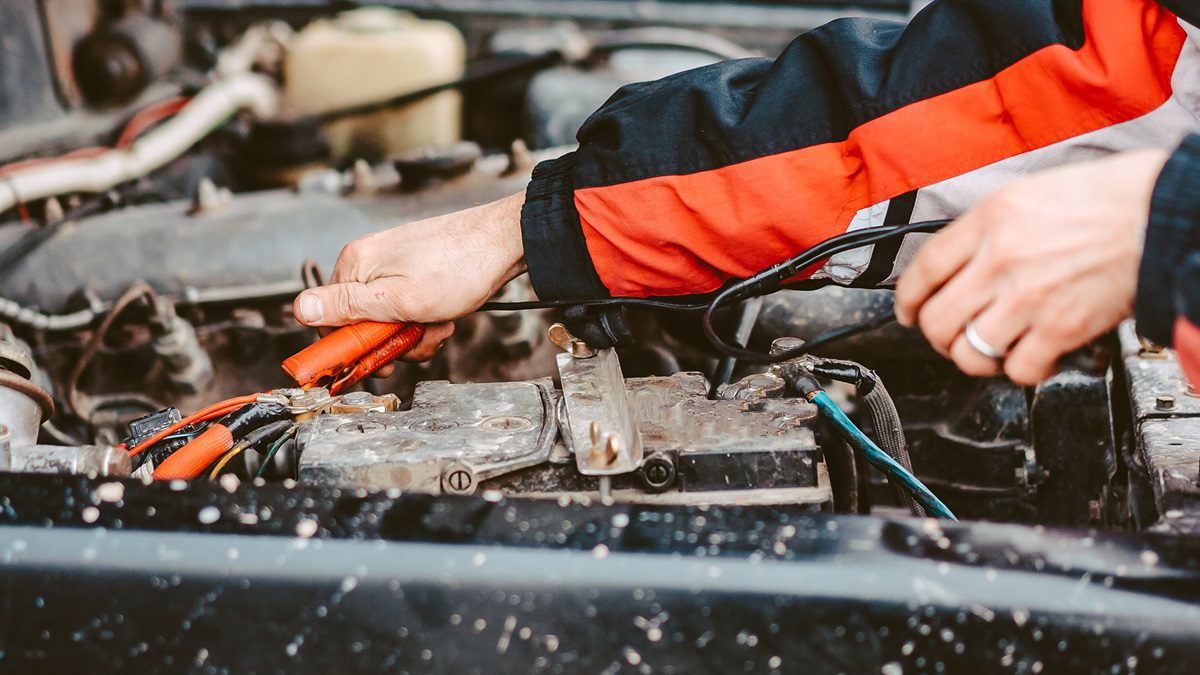Why Won’t My Car Start? Common Electrical Causes

Car trouble always seems to hit when we’re in a rush. If you’ve ever turned the key only to hear a click or nothing at all, you’re not alone. Many drivers ask the same frustrating question, “Why won’t my car start?”
Electrical issues are often the hidden culprits behind a no-start situation. From a loose wire to a drained battery, it doesn’t take much for your vehicle to stall. Let’s walk through the most common reasons, how to fix them, and what they mean for your car’s future health.
Why Won’t My Car Start? Check These Common Electrical Culprits
It can be alarming when your car suddenly refuses to start. Understanding the electrical components behind the issue helps you stay calm and saves time and money.
Here are some top electrical reasons why your car might not start:
- Dead or Weak Battery – If you turn the key and hear a faint click or no sound at all, your battery might be drained. This is one of the most frequent answers to the question: Why won’t my car start?
- Loose or Corroded Battery Terminals – Even if the battery is fine, corrosion or a car battery unplug situation can stop power from flowing.
- Faulty Ignition Switch – A broken ignition switch won’t send the signal your engine needs to turn over.
- Blown Fuse or Relay – Electrical systems rely on fuses to stay operational. A single blown fuse can cut off power.
- Starter Motor Problems – Hearing a loud click but no crank? That could mean your starter isn’t engaging the engine.
- Bad Alternator – The alternator keeps your battery charged. If it fails, even a new battery will lose power fast.
If you’ve ruled out fuel issues and your dashboard battery light was glowing recently, chances are the cause is electrical. Next, let’s break down one of the most confusing symptoms.
Why Is My Car Turning Over But Not Starting?
A car turning over means the engine is cranking, but not firing. This problem is different than a silent no-start, and usually points to spark, fuel, or timing issues.
- Fuel Pump Malfunction – If the fuel pump isn’t working, gas can’t reach the engine, so it cranks but won’t start.
- Faulty Spark Plugs or Wires – Without a spark, combustion won’t happen, leaving you stranded.
- Crankshaft Position Sensor Failure – This sensor tells your engine when to fire. If it fails, the timing is off, and starting becomes impossible.
- Electrical Wiring Damage – Rodents, wear-and-tear, or corrosion can cause hidden wiring issues. Combined with unplugging a car battery, this creates starting chaos.
This can be tough to diagnose without tools, so if your car cranks endlessly with no start, reach out to a certified tech at HEART Auto Care.
Top 6 Signs Your Car’s Battery Might Be the Problem
Batteries don’t last forever. Here’s how to know when it’s time to replace yours before you’re left stranded.
- Dim Headlights: Low brightness could indicate weak battery voltage, often a hint of bigger electrical problems.
- Clicking Noise on Start: This is a classic sign of battery trouble. If you hear clicks instead of a roar, that’s your clue.
- Slow Engine Crank: A sluggish start often means your battery is struggling.
- Electrical Glitches: Random window, radio, or dash light failures can all trace back to poor battery function.
- Swollen Battery Case: Overcharging or heat can make your battery expand, which is a sure sign it’s near the end.
- Dashboard Battery Light Is On: If your dashboard battery light is glowing while driving, the battery or alternator is likely underperforming.
Electrical problems often start subtly. Spotting these early saves you from costly emergencies. Let’s talk next about specific causes related to your starter and ignition system.
- DIY materials: $30–$75
- Small professional patch: $150–$300
- Moderate repair (quarter panel, door): $300–$600
- Extensive body repair and repaint: $1,000+
5 Electrical Problems That Can Prevent Your Car from Starting
Starter and ignition issues don’t always show obvious signs. But they play a vital role when you’re asking, Why won’t my car start?
- Bad Starter Motor – You’ll often hear a single loud click. If jumping the car doesn’t help, the starter could be the issue.
- Defective Ignition Switch – Without a signal from the switch, nothing happens, no lights, no crank, no engine power.
- Neutral Safety Switch Malfunction – Automatic cars have this safety switch to ensure the car only starts in “Park” or “Neutral.”
- Blown Starter Fuse or Relay – If these components fail, power won’t reach the starter. This often happens in colder weather.
- Loose Ground Cable or Battery Terminals – This is a common car battery unplug symptom. Your battery might be connected, but not tight enough to transmit power.
All of these issues can make your car seem completely dead. In the next section, we’ll explain how to narrow things down on your own before calling for help.
What Are the Signs of a Dead Battery in a Car?
The most common signs of a dead battery include silence, clicking, or flickering lights. But there are other subtle clues too.
- You’ve Needed Multiple Jump Starts Lately – If jump-starting only works temporarily, your battery may be nearing its end of life.
- Electrical Accessories Not Working – Seats, infotainment, and power windows won’t respond with a dead or disconnected battery.
- Your Car Was Sitting Unused for a While – Batteries slowly discharge over time. Without regular driving, they lose charge.
- Your Dashboard Battery Light Was Ignored – Many people see this light but wait too long to act. Once the light appears, battery health is already compromised.
- Cold Weather Drains Power Fast – In winter, a weak battery can lose enough charge overnight to prevent starting.
Checking battery health is essential, especially before extreme temperatures hit.
What to Do First if Your Car Won’t Start: A Simple Troubleshooting List
Before calling a tow truck or panicking, try these steps. They could save you time and money when figuring out why won’t my car start.
- Check Dashboard Battery Light: If the dashboard battery light is on, your battery or alternator may need service.
- Turn On Headlights or Radio – If the lights and radio don’t turn on, the battery is likely dead or loose.
- Wiggle the Battery Cables – A quick test, if the car starts after adjusting the terminals, you might be dealing with a car battery unplug symptom.
- Listen for a Click or No Sound – A click points to the starter or battery. No sound may mean a relay, fuse, or ignition switch failure.
- Shift Into Neutral and Try Again
A failing neutral safety switch can prevent starts in “Park.” - Try a Jump Start
If it works temporarily, your battery is weak or your alternator isn’t charging.
A successful jump or click noise tells you more than you might think. Still stuck? Then it’s time to let certified techs take a look and pinpoint the true electrical fault.
How to Prevent Electrical Problems in the Future
Good habits and routine inspections can help prevent the stress of asking, why won’t my car start, in the first place. Keep your car’s electrical system strong with these simple actions.
- Inspect Battery Terminals Monthly – Clean off corrosion with baking soda and water. Tighten any loose clamps.
- Replace Your Battery Every 3–5 Years – Old batteries lose efficiency. Don’t wait until they die.
- Check for Electrical Smells or Flickering Lights – Burnt smells or inconsistent lights are early warnings.
- Watch for Warning Lights Like the Dashboard Battery Light – If your dashboard battery light comes on, don’t delay. That warning signals a deeper charging issue.
- Limit Power Drain – Unplug phone chargers and turn off accessories when the engine is off to avoid battery drain.
- Follow Your Maintenance Schedule – A mechanic can catch issues during routine visits before they become a big repair bill.
Good electrical health equals peace of mind. A little prevention can mean a lot of saved time, and no more no-start surprises.
How Mechanics Diagnose Electrical No-Start Issues
When you bring your car in with a complaint of why won’t my car start, trained techs follow a proven process to isolate the root cause.
Here’s how HEART Auto Care approaches diagnostics:
- Battery Load Testing – This checks if your battery holds proper charge under stress.
- Starter Draw Test – Mechanics measure how much current your starter pulls. Too much draw means it’s failing.
- Alternator Charging Test – This determines if your alternator is sending voltage to your battery as it should.
- Fuse & Relay Continuity Check – Each fuse and relay is tested for breaks, using a multimeter or power probe.
- Computer Scan for Error Codes – Vehicles store trouble codes when something fails. A scan helps guide the diagnosis.
This thorough process helps rule out problems quickly and accurately. It’s far more efficient than guessing, and protects your vehicle from unnecessary part replacements.
Why Won’t My Car Start? Final Thoughts & Expert Help
Car issues can feel overwhelming, but they don’t have to. When you’re asking why won’t my car start, electrical problems are often the key players. By learning how to spot the signs of a dying battery, loose terminals, or faulty relays, you stay a step ahead of major breakdowns.
Don’t wait until you’re stuck in a parking lot with your hazard lights on. Regular inspections, clean battery connections, and early intervention can go a long way.
If you’re in the Chicago North Shore area and need help solving electrical car issues, contact HEART Auto Care for expert support and auto repair you can trust. To schedule service or ask questions about why your car won’t start, visit our Contact Us page.






